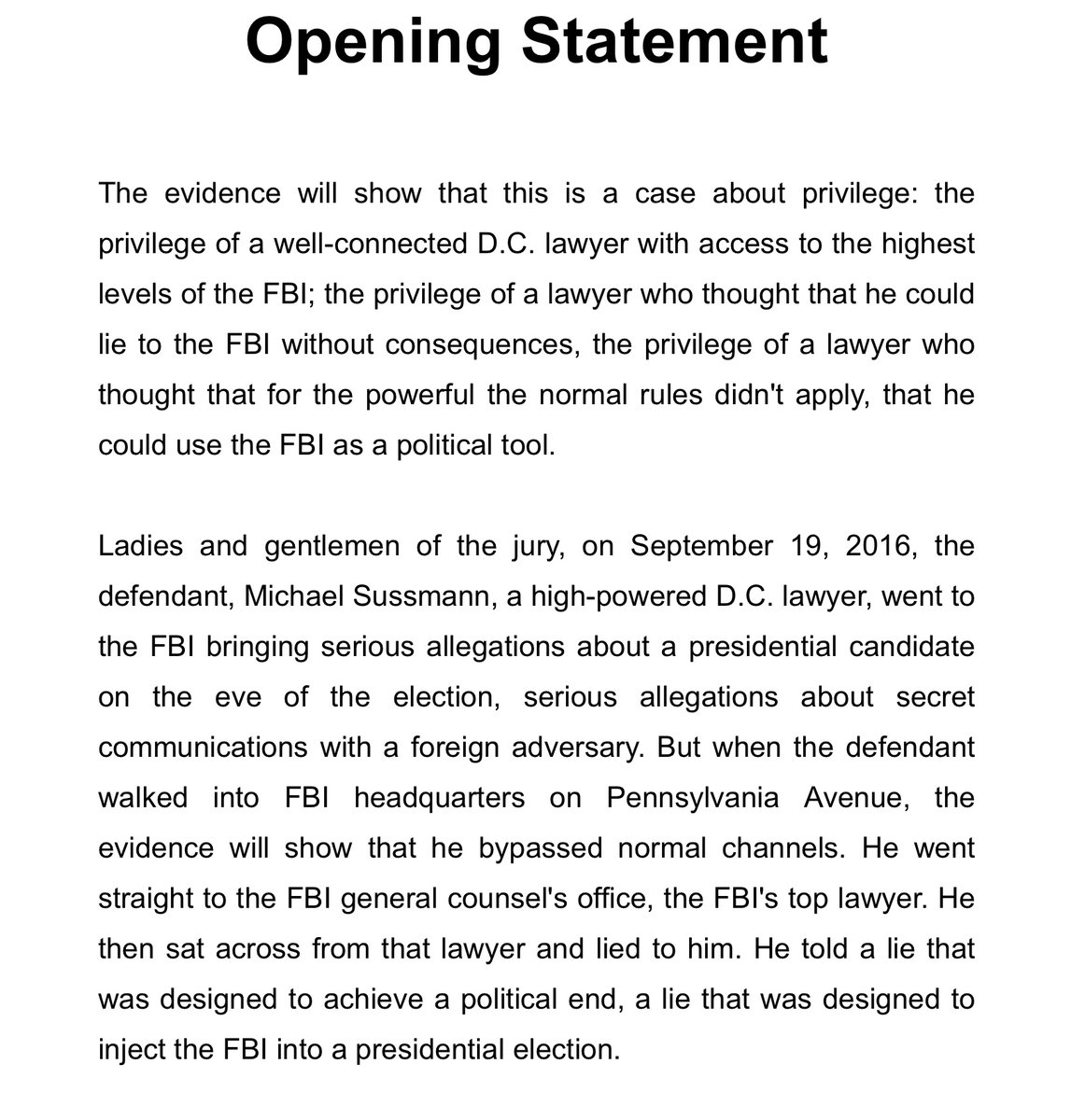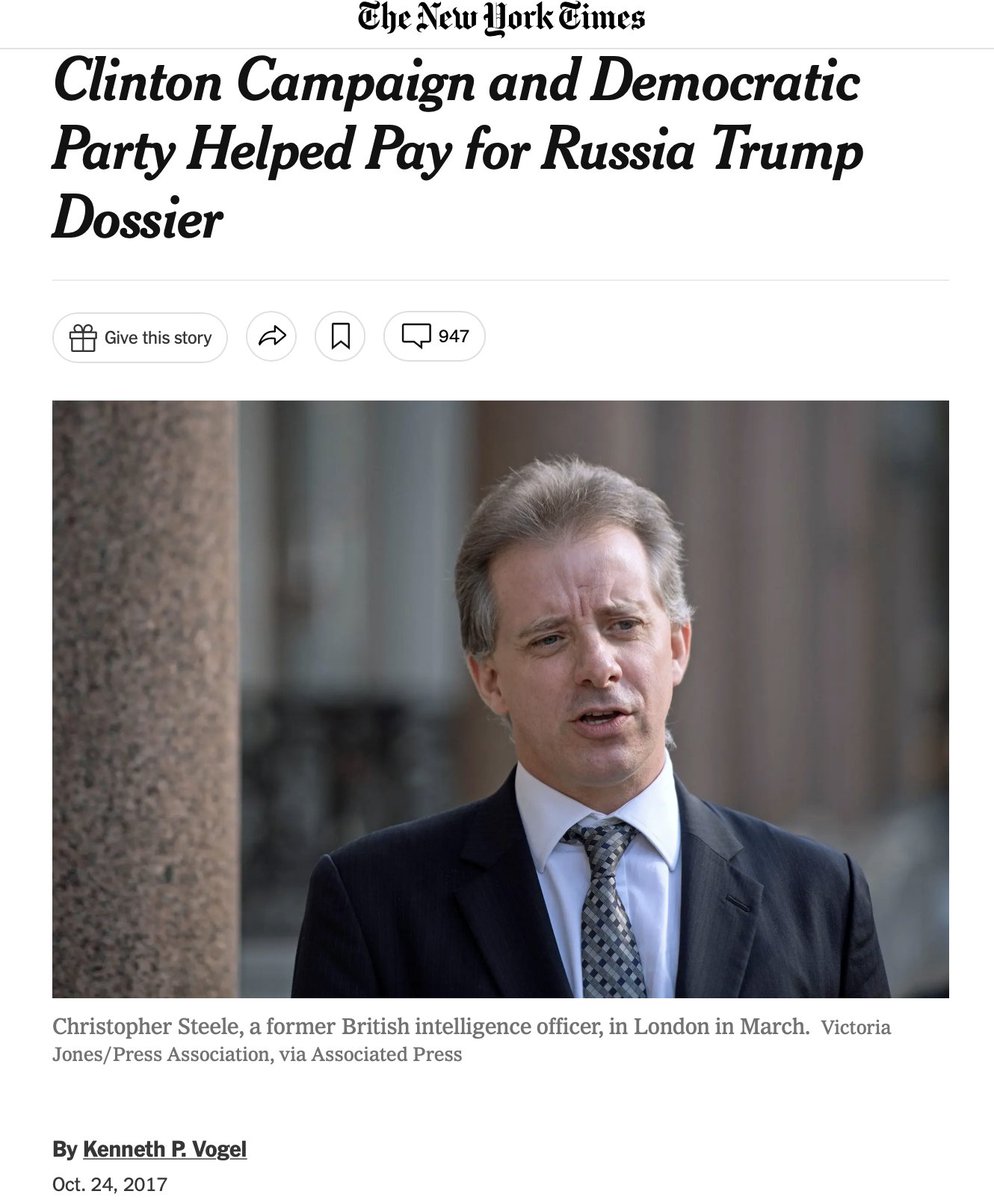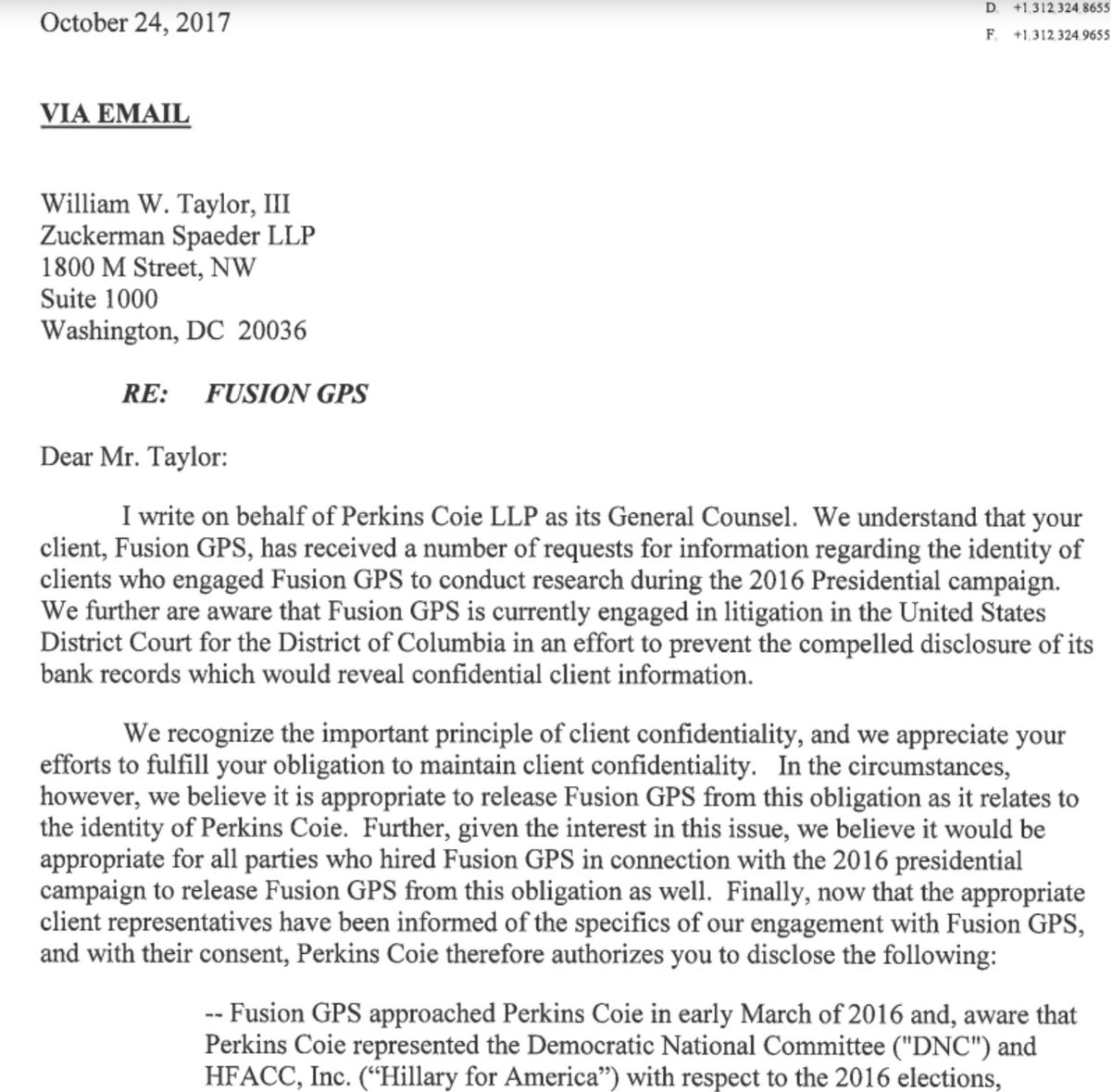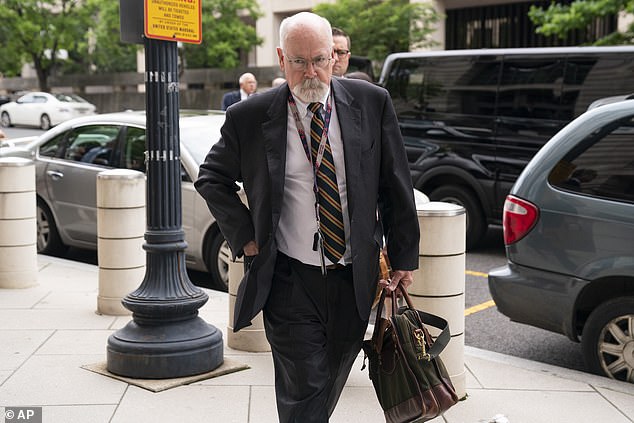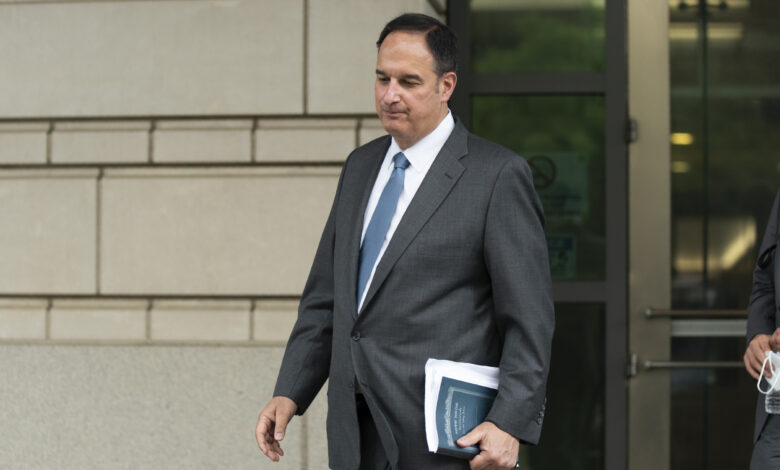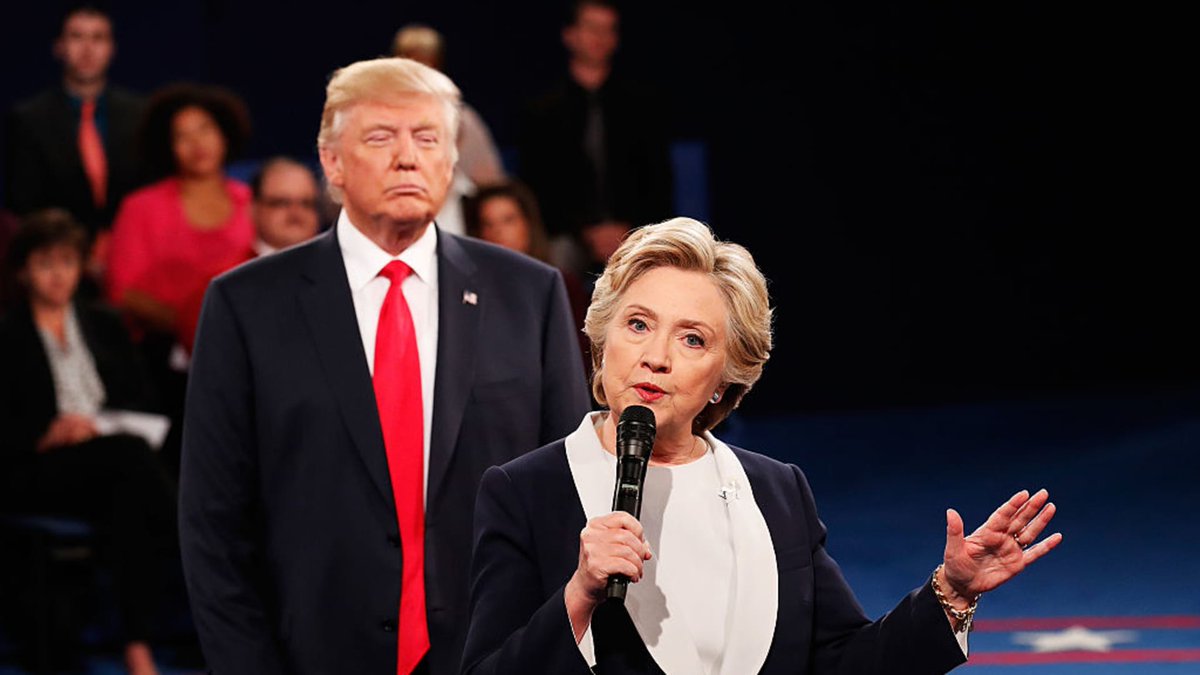
#SpecialCounselDurham
Opening Statement
"The evidence will show that this is a case about privilege: the privilege of a well-connected D.C. lawyer with access to the highest levels of the FBI; the privilege of a lawyer who thought that he could lie to the FBI without consequences
Opening Statement
"The evidence will show that this is a case about privilege: the privilege of a well-connected D.C. lawyer with access to the highest levels of the FBI; the privilege of a lawyer who thought that he could lie to the FBI without consequences
...the privilege of a lawyer who thought that for the powerful the normal rules didn't apply, that he could use the FBI as a political tool.
Ladies and gentlemen of the jury, on September 19, 2016, the defendant, Michael Sussmann, a high-powered D.C. lawyer, went to the FBI...
Ladies and gentlemen of the jury, on September 19, 2016, the defendant, Michael Sussmann, a high-powered D.C. lawyer, went to the FBI...
...bringing serious allegations about a presidential candidate on the eve of the election, serious allegations about secret communications with a foreign adversary. But when the defendant walked into FBI headquarters on Pennsylvania Avenue, the evidence will show that he bypassed
...normal channels. He went straight to the FBI general counsel's office, the FBI's top lawyer. He then sat across from that lawyer and lied to him. He told a lie that was designed to achieve a political end, a lie that was designed to inject the FBI into a presidential election.
What was the lie? The defendant told the FBI general counsel that he was bringing them information about a presidential candidate on his own, not on behalf of any client, but as a good citizen.
But the evidence will show that that wasn't true. The defendant wasn't there as a concerned citizen. He was doing it not for one client, but for two: the opposing presidential campaign and an Internet executive. The defendant lied to direct the power and resources of the FBI...
...to his own ends and to serve the agendas of his clients.
Now, as the judge has told you, the defendant is charged with one count of making false statements to the FBI; that is, for willfully and knowingly making a materially false statement to the general counsel of the FBI.
Now, as the judge has told you, the defendant is charged with one count of making false statements to the FBI; that is, for willfully and knowingly making a materially false statement to the general counsel of the FBI.
..And the government's evidence will show you beyond a reasonable doubt that the defendant is guilty of that charge.
So let me briefly tell you what the evidence will
show.
The evidence will show that on Sunday, September 18th, the defendant, a powerful attorney at a major D.C...
So let me briefly tell you what the evidence will
show.
The evidence will show that on Sunday, September 18th, the defendant, a powerful attorney at a major D.C...
...law firm, texted his friend, James Baker, who was the FBI's general counsel; its top lawyer. He texted Baker on Baker's personal cell phone, and he asked to meet Baker the next day. He told Baker he had something time- sensitive and sensitive he wanted to give to the FBI...
The defendant went on to write in this text that he was, "coming on his own, not on behalf of any client or company, unquote, and that he just wanted to, quote, help the Bureau"
You will see the text for yourselves. You will see that these are the defendant's own words.
You will see the text for yourselves. You will see that these are the defendant's own words.
Now, Baker had known the defendant since they served together at the Department of Justice years before, and so he agreed to meet with him on short notice. He agreed to meet with him on an urgent basis because he trusted him.
The evidence will further show that when the defendant met with the general counsel of the FBI, that that is when he committed the crime charged here.
The defendant lied to the FBI official's face. When they met, he told Baker again that he was not there on behalf of any client, that he just wanted to help the FBI. That is the false statement that's charged in the indictment.
The evidence will show that the defendant then proceeded to tell Baker that he had received information and data that supposedly showed a secret channel of communication between the Trump organization and a Russian bank called Alfa-Bank.
The defendant told Mr. Baker that some cyber researchers had come upon this secret channel and that a major news outlet was set to run the story within days.
The evidence will show that the defendant gave Mr. Baker two thumb drives containing that data as well as white papers that describe the allegations. He gave him these thumb drives, and he left.
Now, you will hear from James Baker that after that meeting he came away thinking that Mr. Sussman had given this information to him as a good citizen, not on behalf of any client.
You will learn that Baker and other high-ranking FBI officials promptly opened a case and directed FBI resources to investigate these serious allegations.
They opened an investigation, an investigation that would later find that the server was merely a spam email server used for sending out marketing emails. The server did not reflect a crime, nor was it a threat to national security.
But there was a crime in all of this: the defendant's lie to the FBI's general counsel. He lied to the FBI's general counsel saying he was not acting on behalf of any client.
The evidence will also show that the defendant was there not on behalf of just one client, but on two clients: the Hillary Clinton Campaign and an Internet executive named Rodney Joffe.
So what will the evidence show? The evidence will show that defendant's lie was all part of a bigger plan, a plan that the defendant carried out in concert with two clients, the Hillary Clinton Campaign and Internet executive Rodney Joffe.
It was a plan to create an October surprise on the eve of the presidential election, a plan that used and manipulated the FBI, a plan that the defendant hoped would trigger negative news stories and cause an FBI investigation, a plan that largely succeeded.
How did the defendant execute this plan? Through his two clients.
First, the Clinton Campaign. You're going to hear that in the summer of 2016, as the presidential election was heating up, the defendant was working at a major D.C. law firm which was acting as legal counsel for..
First, the Clinton Campaign. You're going to hear that in the summer of 2016, as the presidential election was heating up, the defendant was working at a major D.C. law firm which was acting as legal counsel for..
...the Clinton Campaign. You're also going to find as part of -- hear that as part of their campaign efforts they were hired and were paying an investigative firm called Fusion GPS that was hired to do what's called opposition research.
Now, opposition research is something that happens in politics, and it has for years. Republicans do it. Democrats do it. There's nothing illegal about it.
You're going to learn that Fusion GPS was doing opposition research on behalf of the campaign, and through this their...
You're going to learn that Fusion GPS was doing opposition research on behalf of the campaign, and through this their...
...investigators and researchers were digging up any dirt they could find about the opposing candidate, Donald Trump. And when they found something that was dirty, they would plant it in the press and, ultimately, with the FBI.
This brings us to the defendant's second client, Rodney Joffe.
You're going to hear around the same time that Joffe and others were conducting their own kind of opposition research, but it was a different kind.
The evidence will show that Joffe was a high-ranking executive at an
You're going to hear around the same time that Joffe and others were conducting their own kind of opposition research, but it was a different kind.
The evidence will show that Joffe was a high-ranking executive at an
...Internet company and also had interests in other Internet companies. You will learn that Joffe and one of his companies used the defendant as their lawyer, and that they paid the defendant and his firm over a million dollars per year.
The evidence will show that given his position at these various Internet companies, Joffe had access to vast amounts of Internet traffic and data. That included what's known as DNS data, which stands for Domain Name System data. You will learn that DNS data is basically the...
...digital trail that's created when computers look each other up on the Internet in an effort to communicate. It's part of the trail that we all leave when we send emails or surf the Internet.
The evidence will show that in the summer of 2016, Joffe and others started using their access to huge amounts of Internet traffic to conduct opposition research. They started looking at the Internet for any information about the online activities of Trump, his associates, ...
...and certain family members. The evidence will show that later Joffe gave this DNS data to the defendant. This was the data they would later claim showed that the Trump organization was supposedly using a secret email server to communicate with the Russian bank called Alfa-Bank
The evidence will show that Joffe and the defendant knew that the server was a spam email server, but they also claimed that it was being used as a secret communication channel between the Trump organization and Russia.
Now, the evidence will show that the defendant saw this supposed data as a golden opportunity to deliver a big win for both of his clients and to influence a political election, and so he brought together his two clients, Joffe and the Clinton Campaign.
You will learn that the defendant put Joffe in touch with the top lawyer for the Clinton Campaign, and he also connected Joffe with the Fusion GPS research firm, which was also being paid by the Clinton Campaign. He arranged calls and meetings between the two.
That's where the defendant's plan took shape, and the evidence will show that the plan had three parts: a look, a leak, and a lie.
First the look.
The evidence will show that as Sussmann and Joffe met and coordinated with representatives of the Clinton Campaign and Fusion GPS, they looked for more data. You will hear that Joffe instructed people at his companies to scour...
The evidence will show that as Sussmann and Joffe met and coordinated with representatives of the Clinton Campaign and Fusion GPS, they looked for more data. You will hear that Joffe instructed people at his companies to scour...
...Internet traffic for any derogatory information they could find about Trump or his associates' online Internet activities, including potential ties to Alfa-Bank or to Russia. And you will see that Fusion GPS did the same using their access to other information.
Second, the leak. You will hear from the evidence that the defendant and Joffe then leaked the Alfa-Bank allegations to a reporter at the New York Times with the hope and expectation that he would run a story about it.
Third, the lie. You will see that when the reporter didn't publish this story right away, the defendant and others decided to bring this information to the FBI and to create a sense of urgency, to also tell the FBI that a major news organization was running a story within days.
That's when the defendant requested the meeting with the FBI general counsel and told him that he was not doing this for any client.
The evidence will show you that the defendant had at least two reasons to lie.
The evidence will show you that the defendant had at least two reasons to lie.
First you're going to hear that the defendant was a cyber security lawyer who had been hired earlier that year by the Democratic National Committee to represent them in relation to a computer hack where they'd been the victim.
Because of this, the defendant was in frequent contact with the FBI about the hack investigation. They considered him to be the DNC attorney for that matter.
Because they viewed him as the DNC lawyer for the hack, the defendant knew that if he came in and told them that he was representing a political candidate at this time, weeks before an election, they might not meet with him right away, let alone open an investigation.
Second, the defendant knew that if he could get the FBI to investigate the matter and reach out to the press to try to stop the story, that that would make the story more attractive to the press, and they would report on it.
Now, all the while, ladies and gentlemen, the evidence will show that the defendant was billing his time on this project to the Clinton Campaign. You will see the billing records that show that instead of being a good citizen, the defendant was billing his time to a client.
The campaign was footing the bills.
And so when the defendant walked these allegations into the FBI and said he wasn't doing this for any client, that was false. It was false because the defendant personally billed his time to the Clinton Campaign, and...
And so when the defendant walked these allegations into the FBI and said he wasn't doing this for any client, that was false. It was false because the defendant personally billed his time to the Clinton Campaign, and...
...it was false because he was also bringing these allegations on behalf of his other client, Rodney Joffe.
You are also going to hear that the defendant doubled down on his lie. Just five months later, the defendant got himself another meeting with a government agency.
You are also going to hear that the defendant doubled down on his lie. Just five months later, the defendant got himself another meeting with a government agency.
This time the CIA. At the CIA he brought the same allegations about Alfa-Bank along with some other allegations.
You will hear that in setting up that meeting, the defendant told a retired CIA employee that he was seeking a meeting on behalf of a client;
You will hear that in setting up that meeting, the defendant told a retired CIA employee that he was seeking a meeting on behalf of a client;
...but you will also hear that during the actual meeting he told the CIA he was not there on behalf of any client, the same lie the defendant told James Baker. And so in doing so, he confirmed the lie that he made to James Baker.
This was not a mistake or a slip of the tongue.
This was not a mistake or a slip of the tongue.
It was a concerted effort to conceal his clients.
Finally, I also expect that you're going to hear that the defendant actually got caught in his lies when he was required to testify under oath before Congress in December 2017, and when he testified under oath, he was specifically
Finally, I also expect that you're going to hear that the defendant actually got caught in his lies when he was required to testify under oath before Congress in December 2017, and when he testified under oath, he was specifically
...asked about the meetings with the FBI and the CIA.
During that testimony, the defendant admitted that he'd carried out both of these meetings on behalf of a specific anonymous client. He was referring to Joffe.
During that testimony, the defendant admitted that he'd carried out both of these meetings on behalf of a specific anonymous client. He was referring to Joffe.
In other words, the defendant gave Congress something that he hadn't given the FBI, something that he hid from them.
But the evidence will show that the defendant hid something from Congress, too, which is when he approached the FBI's general counsel that day with the...
But the evidence will show that the defendant hid something from Congress, too, which is when he approached the FBI's general counsel that day with the...
...Alfa-Bank allegations. As the election was approaching, he billed his time on that matter not to the unnamed client, but rather to the Clinton Campaign. His own sworn testimony will prove to you that he lied to the FBI and that he's guilty in this case.
So what is the evidence? How are we going to prove to you that the defendant lied to the FBI?
You're going to have three types of evidence: documents, physical evidence, and, of course, witness testimony.
What will the documents show you?
You're going to have three types of evidence: documents, physical evidence, and, of course, witness testimony.
What will the documents show you?
You're going to see that the defendant put his lie in writing.
You're going to see his 42-word text to Baker the night before the meeting where he said he wasn't coming on behalf of any client or company
You're going to see his 42-word text to Baker the night before the meeting where he said he wasn't coming on behalf of any client or company
You're going to see in black and white his billing records that show that the defendant billed his work on this Campaign.
You're going to see emails and phone records that show that beginning in the summer of 2016 the defendant
worked with Fusion GPS to develop the...
You're going to see emails and phone records that show that beginning in the summer of 2016 the defendant
worked with Fusion GPS to develop the...
...Trump/Alfa story and plant it in the press.
You will also see internal FBI records and emails, records that will show you that the defendant's lie mattered, how it misled the officials into thinking he was acting as a good citizen, causing them to take steps and
You will also see internal FBI records and emails, records that will show you that the defendant's lie mattered, how it misled the officials into thinking he was acting as a good citizen, causing them to take steps and
...devote resources to what was ultimately a spam email server and not a national security threat.
You're also going to hear from a number of witnesses.
You will hear from James Baker, the FBI general counsel to whom the defendant made this false statement.
You're also going to hear from a number of witnesses.
You will hear from James Baker, the FBI general counsel to whom the defendant made this false statement.
You're also going to hear from two other officials who Baker briefed after his meeting with the defendant, the very same day it happened, and who memorialized what was said in their notes.
You will hear from the agents who investigated these allegations, what they did and what they found.
And you will hear from an FBI cyber expert who is going to explain to you the basics of DNS data and some of the terminology you might hear in the witness's testimony here.
And you will hear from an FBI cyber expert who is going to explain to you the basics of DNS data and some of the terminology you might hear in the witness's testimony here.
You will also hear from employees of Joffe's company who Joffe tasked to search the Internet in support of defendant's plan.
You will hear from an employee of Fusion GPS who will tell you about Fusion's work on these issues.
You will hear from an employee of Fusion GPS who will tell you about Fusion's work on these issues.
And you will hear from an employee of the defendant's former law firm, who will help explain the firm's billing practices, procedures, and help you to understand the billing records you might see.
Finally, we have several pieces of physical evidence.
First, you're going to have a chance to review the handwritten notes of the 2 officials who met with James Baker the day of the meeting and who wrote down the defendant's lie based on a conversation with Baker.
Next you're..
First, you're going to have a chance to review the handwritten notes of the 2 officials who met with James Baker the day of the meeting and who wrote down the defendant's lie based on a conversation with Baker.
Next you're..
..going to have the two thumb drives the defendant gave to James Baker and the FBI that day, the thumb drives he bought for the meeting, the thumb drives he loaded with the data in the white papers, the thumb drives which the evidence will show he charged to the Clinton Campaign.
This is a case about privilege. No one should be so privileged as to have the ability to walk into the FBI and lie for political ends.
Ladies and gentlemen, whether we are Democrats or Republicans, whether we hate Donald Trump or like him, we have to agree that some things have..
Ladies and gentlemen, whether we are Democrats or Republicans, whether we hate Donald Trump or like him, we have to agree that some things have..
...to be above politics.
One of those things is our law enforcement agencies, and the other is the truth.
After you have heard all the evidence here, you will know the truth here that the defendant lied to the FBI, and that it wasn't a trivial matter or a mistake.
One of those things is our law enforcement agencies, and the other is the truth.
After you have heard all the evidence here, you will know the truth here that the defendant lied to the FBI, and that it wasn't a trivial matter or a mistake.
The evidence will show that this was a breach of trust between a citizen and a law enforcement agency whose mission is to protect us from enemies both foreign and domestic.
The FBI should never be used as a political pawn.
The FBI should never be used as a political pawn.
@threadreaderapp please unroll
• • •
Missing some Tweet in this thread? You can try to
force a refresh


